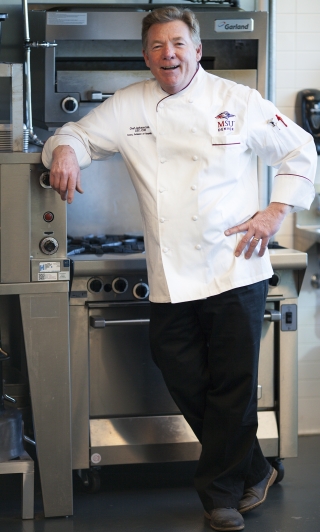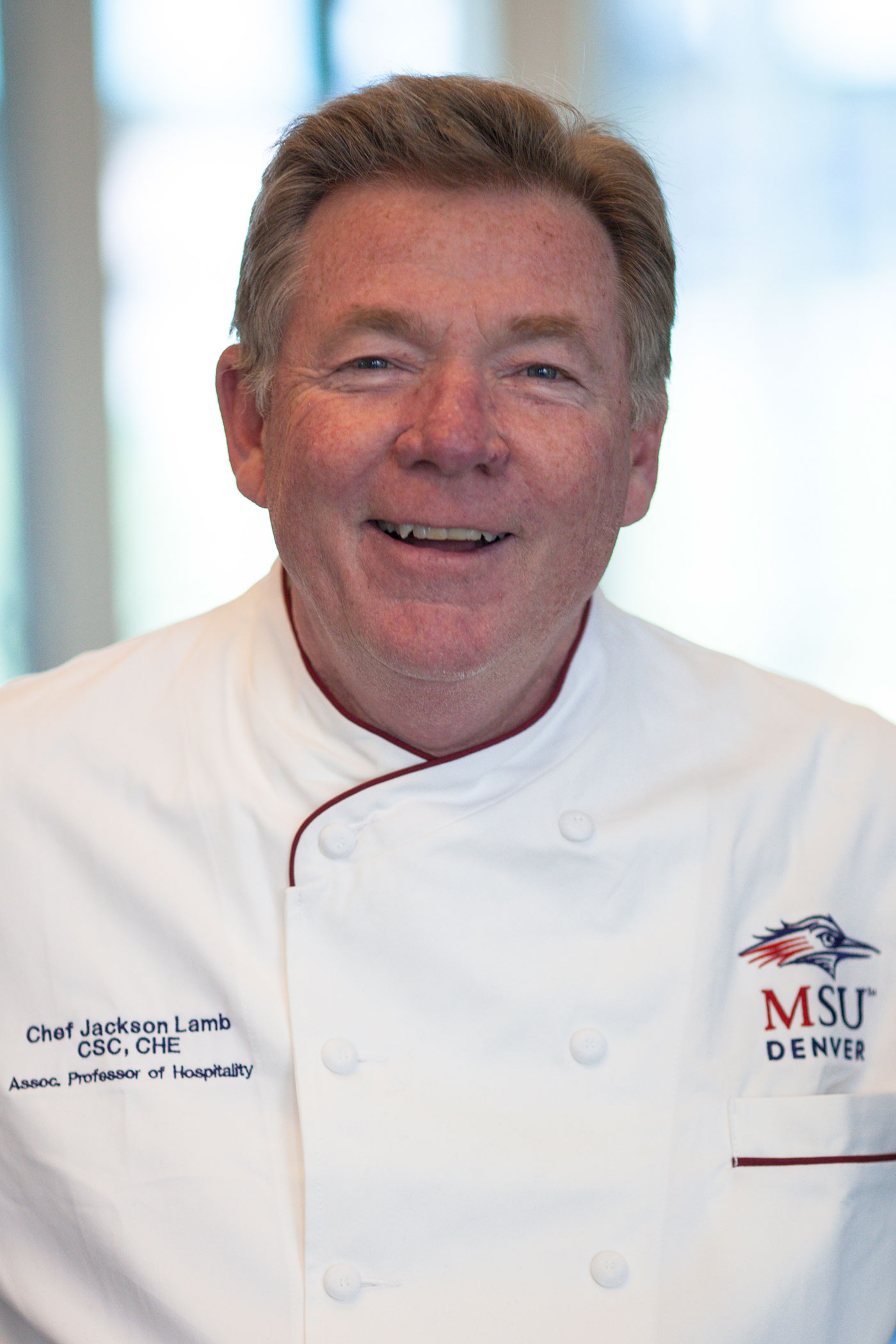
Taking Advantage of Online Education’s Growth Opportunities
29 January 2021MSU Denver sees enrollment growth and success in meeting class objectives during the pandemic.
By Lisa Parrish, GMC Editor
Nearly all educational institutions closed in March 2020 to launch online classes amid the new pandemic outbreak. Culinary educators questioned how they would virtually teach cooking techniques? They wondered if students who completed at-home cooking lab classes would attain the same skill level as previous students who learned to cook in a kitchen lab under an instructor’s watchful eye?
Fast forward 10 months and data is beginning to indicate students can successfully learn to cook at home, achieve the same class objectives as those set before the pandemic, and initiate the process of becoming intuitive, thinking cooks.
 Metropolitan State University (MSU) of Denver is an excellent example of a culinary school that embraced the educational change and has managed to grow its culinary program throughout the pandemic. Under Jackson Lamb, director of culinary management at the School of Hospitality, MSU Denver broadened its potential culinary student base beyond the local city. The school also heavily invested in engaging students in the online environment by tweaking teaching techniques to better suit home-bound students, inviting guest speakers from across the world to provide a professional perspective and trusted students to cook on their own while accurately reporting successes and failures.
Metropolitan State University (MSU) of Denver is an excellent example of a culinary school that embraced the educational change and has managed to grow its culinary program throughout the pandemic. Under Jackson Lamb, director of culinary management at the School of Hospitality, MSU Denver broadened its potential culinary student base beyond the local city. The school also heavily invested in engaging students in the online environment by tweaking teaching techniques to better suit home-bound students, inviting guest speakers from across the world to provide a professional perspective and trusted students to cook on their own while accurately reporting successes and failures.
Lamb is delighted to be a part of the changes brought by the global pandemic and share his positive experiences. “I have spent 30 years in the restaurant industry and 20 years teaching, although some of the time was at the same time,” he said. And, he quickly added he is not “that old,” which he said with a wide grin.
“Under COVID-19, my two major careers are undergoing a huge pivot and I am in the middle of it. I am helping drive the future and am loving it,” he expressed.
Improving online teaching techniques and student engagement
Changes made to classroom instruction in the “Online and Ready” classes, which is how MSU Denver describes their approach to online instruction, included giving students credit for cooking at home.
“I trust the students when they cook on their own. I trust they will tell me what burned and what was cooked properly,” he said. Having students record and present their dishes was instrumental in building this trust. Lamb also discovered students thought of and offered more substitution options than during in-class cooking.
One helpful change for students was to move assignment due dates from Friday at midnight to midnight Sunday. Lamb learned students were already cooking during weekends and he changed the requirement to accommodate their schedules. “It worked great,” he said.
Increased student engagement was a natural outcome of in-class presenting or implementing a flipped classroom strategy. Lamb offered an example from his Basic Skills Cooking class where participants ranged from recent high school graduates to adult master’s degree dietic students. “Everyone had to present in class,” he said. “Master’s degree students were showing what they were doing with black beans and lentils and it made my new students say, ‘I’ve got to up my game.’”
Another benefit of online classes comes in the form of guest speakers who talk about a variety of real-world subjects and can come directly into class from around the country and world. Lamb gave the example of two restauranteurs from Italy and New York City who recently visited his classes. “I encourage instructors to think of their colleagues who live in other areas,” Lamb suggested. Prior to the pandemic, Lamb noted that even local speakers were difficult to pin down as the time it took to travel and speak required a large commitment by the speaker.
Creating engagement also came in the form of gathering students together, in socially distant and masked opportunities.
Lamb cited a field trip to the Gaylord Rockies Resort and Convention Center as a positive engagement opportunity. All students in his classes were invited on a tour given by the hotel manager after the facility reopened. Twenty-five students took advantage of the opportunity and were thrilled at the chance to gather and learn. The students who did not attend the trip were required to research the hotel’s website and that of its parent company, Marriott. The follow-up assignment saw students answering questions based on what they learned. “It was an opportunity to connect and the students jumped at the chance,” Lamb said.
Volunteering also offered students another opportunity for engagement and comradery by participating in the class ingredient distribution process. Students came to campus and assisted with filling ingredient bags and boxes for three-weeks of assignments.
Successful ingredient distribution key to in-home cooking
MSU Denver collects lab fees in exchange for providing students with cooking ingredients. Local students sign up for an on-campus appointment where ingredient bags or boxes are contactlessly loaded into their vehicles. If students are out of town, Lamb sends a Visa gift card to cover the requirements. The ingredients are used over three weeks.
Lamb cited one three-week interval in his Basic Cooking Skills class as an example of engaged students with recipe supplies, learning course outcomes, and becoming intuitive chefs.
He said students received ingredient boxes containing ground beef, two pounds of pinto beans, two pounds of black beans, and supplies required to make meatballs. He instructed his students to use a portion of the ground beef to make meatballs and freeze them for an upcoming lesson on pasta and classic red sauce. He also asked them to use the rest of the ground beef to create a Juicy Pub Burger. Some students made the burgers while others chose to make sliders. Some vegetarian students asked if they could make a black bean burger substitution. Other students asked if they could use leftover potatoes from another ingredient distribution and add French fries to the burger assignment. “The results were absolutely fantastic,” he said.
Two years ago MSU Denver revisited student objectives for the restaurant curriculum. The current online cooking classes are meeting the preset criteria for items like cooking techniques, sanitation and more.
Welcoming new students from near and far
MSU Denver’s online curriculum has allowed it to broaden its potential-student base beyond the confines of Denver or to be constrained by its kitchen lab capacity. And the university has taken advantage of the opportunities. Cooking classes have seen an uptick in enrollment as many laid-off restaurant workers are coming back to school to retool their skills.
Additionally, the university recently began offering a new Master of Science degree in human nutrition and dietetics, only one of a few schools in the country offering this degree. The Basic Cooking Skills class is a program requirement. Lamb added one Basic Cooking Skills class this semester and is adding another next semester. Additionally, the class was limited by space in on-campus kitchens but now is larger at 40 students per class.
The student make-up has changed as well. He now has students from Mexico and Uzbekistan. “Everyone arrives in class every Tuesday and Thursday (regardless of their time zone or country of residence),” he said. “We are global and didn’t realize that was going to happen.”
Looking into the future
MSU Denver is planning for the future of online education. It has been determined during the past 10 months that although many classes can be successfully taught online, some classes are benefitting from a hybrid environment now allowed as pandemic restrictions have slightly lessened.
Lamb cited when the Baking Arts class cook more complex applications, those students need to be in an on-campus cooking class. The answer is a hybrid model that a student group coming to campus kitchens one week completing the difficult recipes while the other student group bakes simpler recipes at home in an Online and Ready environment. The following week the groups switch.
“I can see we will continue with Online and Ready, hybrid and then, when allowed, offer some on-campus classes,” Lamb forecasted about the future.
